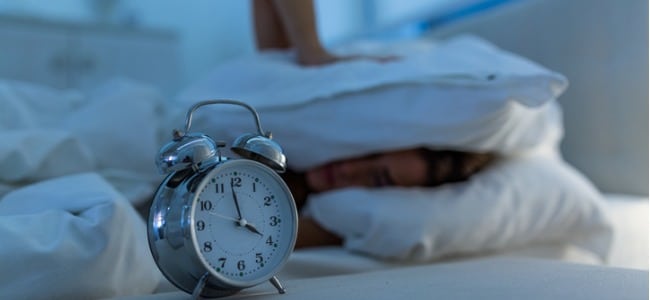Table of Contents
Contact us at 850-518-7320 or schedule your risk-free in-person appointment today!
Schedule AppointmentSleep plays an essential role in health and well-being, which can make life difficult for those who suffer from insomnia. Insomnia is a sleep disorder marked by persistent difficulty falling asleep, staying asleep, and waking up well-rested, affecting over 64 million Americans. Fortunately, medical marijuana has emerged as a safe and natural sleep aid for many insomniacs.
What Is Sleep and Why Do We Need It?
Sleep is a naturally recurring state that is characterized by a loss of consciousness, reduced muscle tone, slowed respiratory and heart rates, and a temporary suspension of senses. It is distinguished from wakefulness by a decreased ability to react to both external and internal stimuli.
How Sleep Affects our Health
Sleep is crucial to our well-being, playing a vital role in various physiological processes, including our:
- Immune system
- Ability to perform day-to-day activities
- Focus and concentration
- Nervous system
As you sleep, your body works to restore cells, healing and revitalizing your muscles, organs, and other structures. Sleep also coincides with the natural release of growth hormones in children and adolescents, enabling proper development. In addition, sleep enhances your cognitive abilities by storing new information and eliminating any unnecessary toxins, which supports optimized brain function.
Research also indicates that a lack of adequate sleep each night may lead to an increase in negative symptoms in the following conditions:
- Depression
- Anxiety
- Schizophrenia
- Alzheimer’s disease
- Stroke
- Cancer
To ensure you are receiving the extensive benefits that sleep can provide, make sure to get an adequate amount each night, which varies depending on your age:
- 0-3 months: 14-17 hours
- 4-11 months: 12-15 hours
- 3-5 years: 10-13 hours
- 6-13 years: 9-11 hours
- 14-18 years: 8-10 hours
- 25-90 years: 7-9 hours
Understanding the Natural Sleep Cycle
Our natural sleep cycle is comprised of four stages of sleep and is regulated by our circadian rhythm. Our circadian rhythm is the body’s internal 24-hour clock, ensuring our essential functions and processes are running smoothly throughout the day. The circadian rhythm is directly affected by external factors, such as light exposure and exercise.
Exposure to light during the day allows the body to stay alert, keeping us awake and active. When night falls, our circadian rhythm facilitates the production of melatonin, a sleep-inducing hormone. The circadian rhythm aligns our states of alertness and sleep with the day and night to create a sleep-wake cycle that optimizes our productivity during the day.
Our sleep cycle has four stages, distinguished by two phases: non-rapid eye movement (NREM) and rapid eye movement (REM). NREM is the first phase, and it has three stages:
Stage 1: Light Sleep
Light sleep is where you gradually fall asleep, and eye movement and muscle activity slowly decrease. This stage usually only lasts five to ten minutes.
Stage 2: Most Sleep
Most sleep is when your heartbeat and breathing slow down and your body temperature decreases. This stage has periods of muscle tone and muscle relaxation and lasts around 25 minutes in the initial cycle and then gradually becomes longer.
Stage 3: Deep Sleep
In deep sleep, also called slow-wave or restorative sleep, your heartbeat and breathing are at the lowest during this stage, and you have no eye movement or muscle activity. You may have difficulty waking from this stage, and if you do, you may feel groggy and disoriented.
The final stage and second phase of sleep is known as:
REM Sleep
REM sleep is the deepest stage of sleep and is responsible for the majority of your body’s healing and restoration. During REM sleep, your eyes move around quickly beneath your eyelids, and your brain activity is similar to when you are awake. REM sleep is thought to be when your brain consolidates memories and processes information from the day, and it is also when dreams occur. In this phase, your major muscles are temporarily paralyzed, and it usually begins about 90 minutes after you fall asleep. Although you spend more time in REM sleep as the night goes on, you usually only dream during the last few hours of sleep.
Medical Marijuana for Insomnia
Cannabis is well-known for helping people relax and destress, making it a natural sleep aid. Individuals who have difficulty sleeping due to an anxious mind, restlessness, or insomnia may find marijuana particularly effective for falling asleep faster and staying asleep longer.
There are two primary types of insomnia, including:
- Chronic insomnia disorder: when a person experiences sleeping difficulties and other insomnia symptoms for at least three days each week for more than three months
- Short-term insomnia disorder: when symptoms of insomnia last less than three months or do not occur three times per week
Studies have demonstrated that medical marijuana may be an effective solution for insomnia. This treatment works by restoring a person’s natural sleep cycle, which becomes out of sync in individuals living with insomnia.
The Endocannabinoid System and Sleep
The endocannabinoid system is a complex network of receptors that are activated by cannabinoids, including:
- Endocannabinoids: naturally occurring in the body
- Phytocannabinoids: plant-derived, such as those in cannabis
- Synthetic cannabinoids: produced in a lab
This system helps maintain the body’s homeostasis and is responsible for a variety of physiological processes, such as:
- Pain
- Appetite
- Memory
- Circadian rhythm
- Sleep-wake cycle
- Immune system
- Mood
Phytocannabinoids in cannabis, such as cannabidiol (CBD) and tetrahydrocannabinol (THC), may be effective at helping sleep disorders like insomnia because they bind to receptors that affect the sleep-wake cycle. Additionally, CBD and THC have been proven to have sedative effects that lower anxiety and pain, which both play significant roles in preventing a full night’s rest. Working together, CBD and THC can have a therapeutic impact on alleviating discomfort and promoting sleep.
Medical Marijuana’s Route of Administration
The type of medical marijuana used for insomnia is important, as well as the route of administration. For example, inhaled cannabis only has an effect for two to three hours, which may cause waking throughout the night. Instead, oral routes like edibles may be optimal for those with insomnia looking for a full night’s sleep, as the effect will last up to six hours. Other routes of administration with long-lasting effects include:
- Capsules
- Transdermal patches
- Metered-dose inhalers
- Sprays
Best Cannabis Strains for Sleep
Not all cannabis strains can treat specific symptoms in the same way. In fact, some strains of cannabis can provide steady energy, so it may be best to avoid these strands before bed. At the Medical Marijuana Treatment Clinics of Florida (MMTCFL), we have compiled a list of the best relaxing cannabis strains to help treat insomnia. However, keep in mind that individual strains affect each person differently, so finding the solution for your insomnia may require some trial and error.
Granddaddy Purple
Granddaddy Purple, commonly known as “GDP” or “Granddaddy Purp,” is a famous Indica cross between Big Bud and Purple Urkle. This classic Indica, THC-dominant strain smells and tastes of grapes and is ideal for treating symptoms like:
- Insomnia
- Chronic pain
- Muscle spasms
- Appetite loss
- Stress
The Granddaddy Purple strain exhibits high levels of myrcene, a terpene that is commonly believed to provide relaxing effects.
Mazar
Mazar originates from the mountains of Afghanistan and is a notorious sedative strain. This strain tastes of hash, fruit, citrus, and flowers and can be excellent for:
- Relieving insomnia
- Stimulating your appetite
- Alleviating chronic pain
Mazar is a heavy Indica strain, capable of producing a sense of euphoria that enables you to feel relaxed, happy, and ready for a great night’s rest.
Tahoe OG Kush
Tahoe OG Kush is a strong and fast-acting strain perfect for those suffering from insomnia, pain, or lack of appetite. This nighttime hybrid produces a sluggish, heavy body sensation. Along with embodying all of the typical Indica strain effects, Tahoe OG contains an added euphoric, Sativa-like kick.
God’s Gift
God’s Gift is a child of Granddaddy Purple and OG Kush, a true “gift” for insomniacs. This Indica strain will leave you feeling euphoric by producing a heavy body high that instills a deep sense of peace and relaxation to ease you into uninterrupted sleep. Due to the high THC content, God’s Gift is not recommended for those just starting with medical marijuana.
Northern Lights
Northern Lights is a pure Indica cherished for its resinous buds, fast flowering, and resilience during growth. The Northern Lights strain generates a psychoactive effect to settle firmly throughout the body, relaxing muscles and easing pain in the body.
3 Tips for Using Medical Marijuana To Treat Insomnia
If you have recently been authorized to use medical marijuana as a sleep aid, these three tips can help you learn to use cannabis correctly and safely:
Make Sure You Have the Right Cannabis Strain and Route
There are hundreds of different cannabis strains, and each of them has various effects on the body. The first tip to keep in mind is to ensure that you’re using the correct strain of cannabis to help you get a good night’s rest. Most people prefer Indica strains like the ones listed above to optimize their sleep throughout the night.
The route of administration is also key when selecting medical marijuana for insomnia. Oral products, like capsules or edibles, can last up to six hours, which is optimal for sleeping through the night. Remember, what strain and route of administration work for you may be different than what is effective for someone else.
Do Not Mix Cannabis With Other Sleep Aids
If you consistently have difficulty sleeping, you’ve probably tried other ineffective sleep aids before medical marijuana. Make sure not to mix your medical marijuana with other sleep aids like sleeping pills or opioid medications. Research indicates that mixing marijuana and opioids can be dangerous because they both have depressant effects, which may suppress the central nervous system and lead to:
- Reduced brain function
- Low blood pressure
- Extreme sedation
- Coma or death
Studies also show that cannabis use paired with opioid use increases the risk of developing an opioid use disorder, emphasizing the importance of using medical marijuana as a stand-alone treatment.
Continue Practicing Good Sleep Habits
Along with using medical marijuana, try to incorporate other healthy sleep practices into your insomnia treatment. It may help to establish a bedtime routine that includes:
- Going to sleep around the same time every night
- Reducing screen time
- Avoiding heavy meals and alcohol consumption
- Lowering the lights and thermostat
- Showering or bathing two hours before bed
See If You Qualify for Medical Marijuana for Insomnia
Do you suffer from insomnia? At MMTCFL, we can determine if you are eligible for medical marijuana and help you get your medical marijuana registration card. Get started with medical marijuana today by taking our online eligibility survey. To learn more, call (850) 318-9729.
Schedule an Appointment with MMTC Doctor
Contact us at (850) 906-5000 or click on the calendar below to schedule your risk-free in-person appointment at the MMTC location nearest you. Patients must be 21 or older.

For more appointment times and dates, click the city where your clinic is located or call 850-906-5000.





